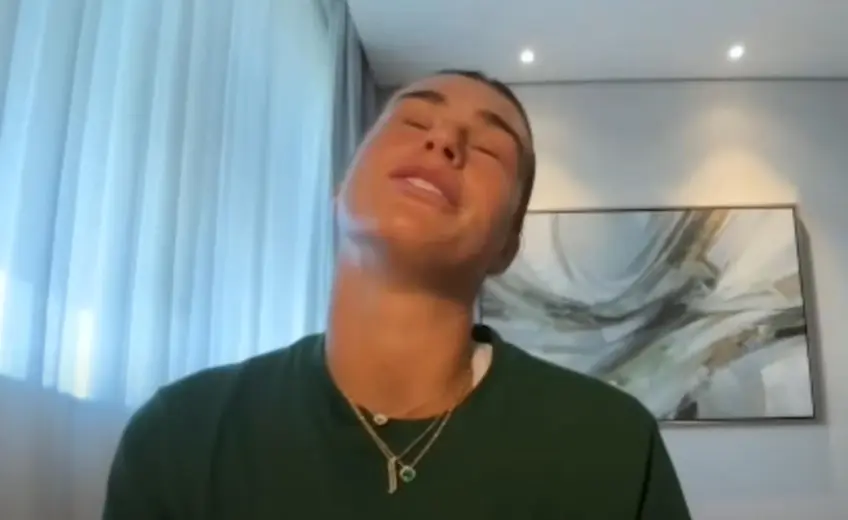
Aryna Sabalenka recently opened up about the challenges and pressures she faced at the WTA Finals, emphasizing how her pursuit of the Year-End No. 1 ranking ultimately distracted her. Despite trying to maintain focus, the weight of expectations, media coverage, and widespread attention shifted her mindset, leading to two unexpected defeats that highlighted the complexities of competing under such scrutiny.
At the season-ending event in Riyadh, Sabalenka entered with a solid lead over her closest competitor, Iga Swiatek. With a 1,046-point advantage, the 26-year-old Belarusian was in a favorable position to claim the No. 1 year-end ranking for 2024. The stakes were high, but Sabalenka initially approached the competition with a determined focus. She won her first two matches in the group stage, appearing poised and prepared to seal her top spot. Many expected Swiatek to keep pace by defeating Coco Gauff and setting up a final stage duel for the top ranking. However, Swiatek’s loss to Gauff altered the narrative entirely, meaning Sabalenka had already secured the prestigious accolade regardless of her performance in her remaining group-stage match.
This sudden shift in stakes and the realization that she no longer needed to fight for the No. 1 spot threw Sabalenka off balance. In her last group-stage match, she faced Elena Rybakina and suffered a surprising three-set defeat. Sabalenka later admitted that achieving her goal prematurely impacted her motivation and focus. The pressure to maintain momentum was further highlighted when she fell to Coco Gauff in the semifinals. These losses marked a rare dip in form for the Belarusian, who had previously won 22 out of her last 23 matches and had not experienced back-to-back defeats all season.
Reflecting on her experience, Sabalenka candidly discussed her mindset during an episode of Andy Roddick’s podcast, *Served with Andy Roddick*. “I wasn’t really focused on the No. 1 ranking and what I should do to finish the year as world number one. I didn’t do that, I was like, whatever,” she explained. “They asked me, do you know what you have to do to finish the year as world number one? I was like no, and don’t tell me, please. I don’t want to know that; I just wanted to focus on my tennis.” The media coverage following her initial victories added an unexpected layer of pressure. “After winning two matches, the news was everywhere, and I was just like, please, don’t do that to me. That’s probably why I kind of lost my focus. At that moment, I felt like I did everything I could this season. I don’t have any energy left to compete and to fight.”
The toll of maintaining motivation, even after achieving significant milestones, was evident. Sabalenka admitted to struggling with motivation during her match against Rybakina, despite their history of tight contests. The Belarusian was widely considered the favorite due to her exceptional form and Rybakina’s extended absence from competition. Yet, Sabalenka’s mindset played a decisive role, leading to a 6-4, 3-6, 6-1 defeat. In her post-match comments, she acknowledged the challenge: “This is something I have to learn—how to keep myself motivated and hungry and being 100% on in this kind of match when you know that you’re already in the semis and the only motivation for you is points and money. But that was tricky.”
Throughout her career, Sabalenka has been labeled a “one-dimensional” player by some critics due to her reliance on power and aggressive baseline play. However, her recent successes have shown a more well-rounded game. She credits her evolution to hard work, perseverance, and the guidance of a forward-thinking coach. “I came on tour as a hard-hitter and I’ve been told most of my career that I’m not talented, that I only hit balls hard and I’m good at the baseline,” she recounted to Roddick. “I was just a hard worker; I could stay the whole day on the court. Then we started working with my coach, who’s quite young but saw this vision of me as more than just an aggressive player. I can defend, I can use the slice. Finally, things started working together.”
Sabalenka’s transformation and resilience are evident in her accomplishments over the past two years. She became world No. 1 for the first time in her career and captured three Grand Slam titles since 2023, proving she is more than just a powerful hitter. Her journey underscores the complexities of balancing ambition, personal growth, and the external pressures of being at the top.
With the 2024 season officially behind her, Sabalenka will take some time to recharge before embarking on her next chapter at the United Cup, set to kick off the new season. As she looks ahead, the Belarusian will likely continue to refine her game and build on the lessons learned from a remarkable, albeit challenging, year. Sabalenka’s candid reflections offer a glimpse into the mental demands of professional tennis and the ongoing evolution of a champion determined to stay at the pinnacle of her sport.
Leave a Reply